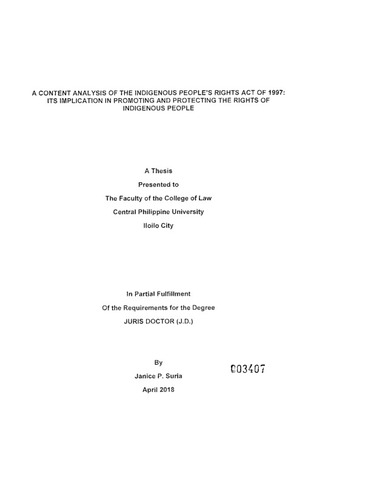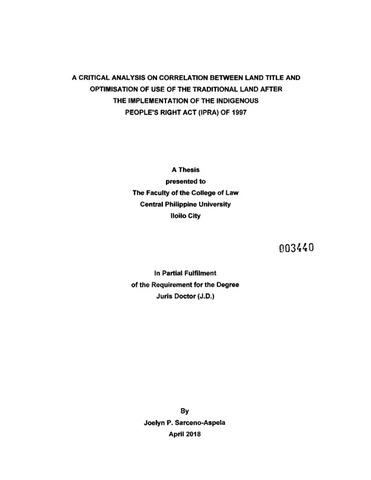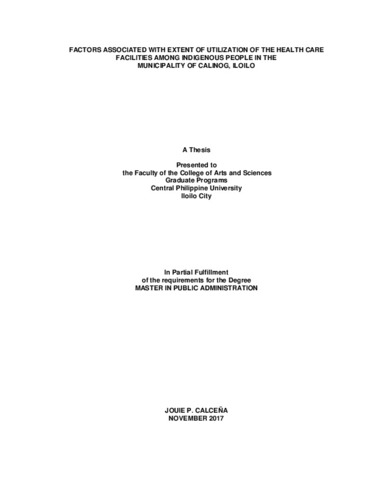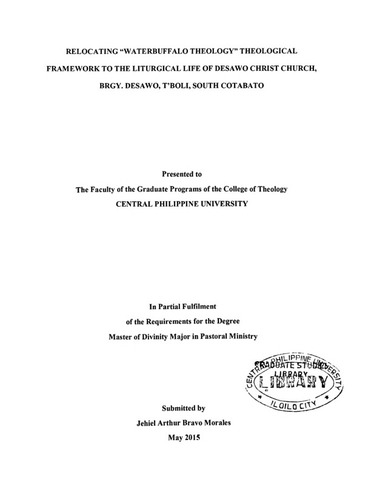A content analysis of the Indigenous People’s Rights Act of 1997: Its implication in promoting and protecting the rights of indigenous people

Page views
3,826Date
2018Author
Thesis Adviser
Defense Panel Chair
Share
Metadata
Show full item record
Abstract
This study was primarily conducted to analyze the content of The Indigenous People’s Right Act of 1997 (IPRA) to determine its implication in promoting and protecting the rights of indigenous people. It was conducted within School Year 2016-2017. It focused on the discussion of five important features of IPRA such as the right to ancestral domains among others, its ambiguous provisions, and its proposed amendments. This qualitative research employed content analysis research design through examining and interpreting the carefully selected provisions of the law. No specific key informants were obtained. Data gathered was based on thorough research of related literature and studies affecting the rights of indigenous people via books and online articles as fast and accurate sources of information with the application of IPRA.
Analysis and conclusions were drawn with the help of gathered information about IPRA, IP. their statuses as well as issues concerning IPs rights. The findings and analysis were presented according to the objectives of the study. Some points found out were: The rights granted to the ICCs/IPs over the natural resources in their ancestral domains merely gives them the right to the small-scale utilization of these resources and a priority in their large-scale development and exploitation. The researcher found nine ambiguous provisions in the law. One of the proposed amendments to IPRA is a deletion of the term “natural resources” in the phrase “right to develop lands and natural resources” because natural resources are properties of the State as supported by the Regalian Doctrine.
Description
Abstract only
Suggested Citation
Suria, J. P. (2018). A content analysis of the Indigenous People’s Rights Act of 1997: Its implication in promoting and protecting the rights of indigenous people (Unpublished postgraduate thesis). Central Philippine University, Jaro, Iloilo City.
Type
ThesisSubject(s)
Department
College of LawDegree
Juris DoctorShelf Location
Law Library 340.72 Su77 2018
Physical Description
viii, 103 leaves
Collections
- Juris Doctor [144]
The following license files are associated with this item:
Except where otherwise noted, this item's license is described as Attribution-NonCommercial-NoDerivs 3.0 Philippines
Related items
Showing items related by title, author, creator and subject.
-
A critical analysis on correlation between land title and optimisation of use of the traditional land after the implementation of the Indigenous People’s Right Act (IPRA) of 1997
Sarceno-Aspela, Joelyn P. (2018)The fundamental development of indigenous people lies in the recognition of their rights to their traditional territories. This study was conducted to examine the experiences of indigenous communities after the recognition ... -
Factors associated with extent of utilization of the health care services among indigenous people in the Municipality of Calinog, Iloilo
Calceña, Jouie P. (2017)This quantitative-descriptive correlational research sought to examine the factors associated with the extent of utilization of health care services of Panay-Bukidnon Indigenous Peoples in the Municipality of Calinog, ... -
Relocating "Waterbuffalo Theology" theological framework to the liturgical life of Desawo Christ Church, Brgy. Desawo, T'Boli, South Cotabato
Morales, Jehiel Arthur B. (2015)This study sought to relocate “Waterbuffalo Theology” to the worship life of the T’boli in Desawo Christ Church. Particularly, it sought to critically analyze on how Christianity have changed the T’boli people in their ...





